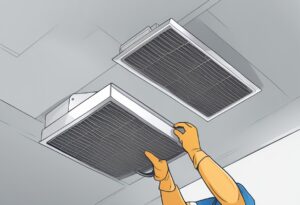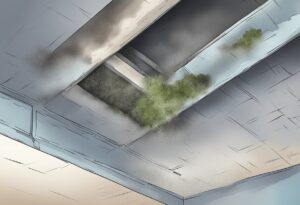Air filters are an essential component of any HVAC system. They are responsible for trapping dirt, dust, and other airborne particles that can negatively impact indoor air quality. Over time, air filters become clogged with debris, which can reduce their effectiveness and lead to a variety of problems. For this reason, it is important to change air filters regularly, even when they look clean.

One common misconception is that air filters only need to be changed when they are visibly dirty. However, this is not the case. Even when air filters appear clean, they can still be clogged with microscopic particles that are invisible to the naked eye. These particles can accumulate over time and lead to reduced air flow, increased energy consumption, and decreased indoor air quality. Therefore, changing air filters on a regular basis is crucial for maintaining a healthy and efficient HVAC system.
Fundamentals of Air Filtration

Purpose of Air Filters
Air filters are an essential component of heating, ventilation, and air conditioning (HVAC) systems. Their primary purpose is to remove airborne contaminants from the air, such as dust, pollen, mold spores, and other particles. These contaminants can cause health problems, reduce indoor air quality, and damage HVAC equipment.
Air filters can also help to improve the energy efficiency of HVAC systems by reducing the amount of work required to circulate air through the system. When the air filter is dirty, the HVAC system must work harder to push air through the filter, which can increase energy consumption and utility bills.
How Air Filters Work
Air filters work by trapping airborne particles as air flows through the filter. Most air filters are made from a material such as fiberglass, pleated paper, or synthetic fibers. The filter material is designed to capture particles of a certain size, measured in microns.
As air flows through the filter, particles become trapped in the filter material. Over time, the filter becomes clogged with particles, reducing its effectiveness. This is why it’s important to change air filters regularly, even when they look clean.
Some air filters are designed to be washable and reusable, while others are disposable. Disposable air filters are typically less expensive and easier to replace, while washable filters can be reused multiple times, reducing waste and saving money in the long run.
In conclusion, understanding the fundamentals of air filtration is essential for maintaining a healthy and efficient HVAC system. Regularly changing air filters is a simple and effective way to improve indoor air quality and reduce energy consumption.
Health and Air Quality Benefits
Preventing Allergens and Pollutants
Regularly changing air filters can help prevent allergens and pollutants from circulating in the air. Even when air filters appear to be clean, they can still be harboring harmful particles that can trigger allergies or respiratory issues. By replacing air filters on a regular basis, individuals can reduce the amount of dust, pollen, and other allergens in their homes or workplaces. This can lead to improved breathing and a reduction in allergy symptoms.
Improving Indoor Air Quality
Changing air filters regularly can also improve indoor air quality. Dirty air filters can lead to a buildup of dust and other particles in the air, which can be harmful to the respiratory system. By replacing air filters, individuals can ensure that the air they breathe is clean and healthy. This is particularly important for individuals with respiratory issues or weakened immune systems.
In addition, clean air filters can help reduce the spread of airborne illnesses. By trapping harmful particles, air filters can prevent the spread of viruses and bacteria in the air. This can be especially important in public spaces, such as schools or hospitals, where individuals may be more susceptible to illness.
Overall, regularly changing air filters is an important step in maintaining a healthy indoor environment. By preventing allergens and pollutants from circulating in the air, individuals can improve their respiratory health and reduce the spread of illness.
System Efficiency and Longevity
Enhancing HVAC Performance
Changing air filters regularly is essential for enhancing the performance of HVAC systems. Dirty filters can restrict airflow, forcing the system to work harder to maintain the desired temperature. This increased workload can cause wear and tear on the system, leading to higher energy bills and reduced efficiency.
Regularly changing air filters can help prevent this by ensuring that the system is running at optimal efficiency. This can lead to lower energy bills, improved indoor air quality, and a more comfortable home or office environment.
Extending System Life
In addition to improving efficiency, changing air filters regularly can also help extend the life of HVAC systems. Dirty filters can cause excess strain on the system, leading to premature failure and costly repairs.
By changing air filters regularly, homeowners and business owners can help prevent this and extend the life of their HVAC systems. This can save money in the long run by reducing the need for costly repairs and replacements.
Overall, changing air filters regularly is a simple and effective way to enhance the performance and longevity of HVAC systems. By doing so, homeowners and business owners can enjoy lower energy bills, improved indoor air quality, and a more comfortable living or working environment.
Economic Considerations
Reducing Energy Costs
Regularly changing air filters can help reduce energy costs in the long run. Dirty air filters can cause the HVAC system to work harder to circulate air throughout the building, which can lead to higher energy bills. By replacing air filters regularly, building owners can ensure that the HVAC system is running efficiently, which can lead to lower energy costs.
Minimizing Repair Expenses
Dirty air filters can also cause HVAC systems to malfunction, leading to costly repairs. When air filters become clogged with dirt and debris, it can cause the system to overheat or even shut down completely. By replacing air filters regularly, building owners can avoid costly repairs and extend the lifespan of their HVAC system.
In addition, regularly changing air filters can also improve indoor air quality, which can lead to a healthier and more productive environment for building occupants. By investing in regular air filter replacements, building owners can save money in the long run while also providing a better living or working space for their tenants.
Maintenance Best Practices
Understanding Filter Ratings
When it comes to air filters, understanding the ratings is important to ensure that the right filter is being used for the specific system. The MERV (Minimum Efficiency Reporting Value) rating system is commonly used to rate air filters. The higher the MERV rating, the more efficient the filter is at capturing small particles. However, it’s important to note that higher MERV ratings may also reduce airflow, which can put additional strain on the system.
It’s recommended to consult with a professional to determine the appropriate MERV rating for a specific system. Additionally, some filters may have additional ratings such as HEPA (High-Efficiency Particulate Air) or ULPA (Ultra-Low Particulate Air), which are even more efficient at capturing particles.
Schedule for Filter Changes
Regularly changing air filters is crucial for maintaining good indoor air quality and preventing damage to the HVAC system. Even if a filter looks clean, it may still be clogged with particles that are too small to see.
The frequency of filter changes depends on several factors such as the type of filter, the MERV rating, and the amount of use the system receives. As a general rule, it’s recommended to change filters every 1-3 months. However, it’s important to refer to the manufacturer’s recommendations for specific filters and systems.
Keeping a schedule for filter changes is a good way to ensure that filters are being changed at the appropriate intervals. It’s also important to regularly inspect filters for signs of damage or excessive dirt accumulation, as this may indicate a need for more frequent changes.
By following these maintenance best practices, homeowners can ensure that their HVAC system is running efficiently and providing good indoor air quality.
Challenges of Visual Inspection
When it comes to changing air filters, relying solely on visual inspection can be a challenge. Even when filters appear clean, they may still be in need of replacement. This section will explore some of the limitations of appearances and the risks associated with infrequent changes.
Limitations of Appearances
Air filters can appear clean even when they are not. This can be due to a variety of factors, such as the type of filter, the environment in which it is used, and the length of time it has been in use. For example, a filter may be clogged with dirt and debris that is not visible to the naked eye. Additionally, some filters are designed to trap microscopic particles, such as allergens and pollutants, that are not visible to the human eye.
Risks of Infrequent Changes
Infrequent changes can lead to a variety of problems, including reduced air quality, increased energy costs, and decreased HVAC system performance. When filters are not changed regularly, they become clogged with dirt and debris, which can restrict airflow and cause the system to work harder than necessary. This can lead to increased energy costs and decreased performance. Additionally, clogged filters can reduce air quality by allowing pollutants and allergens to circulate throughout the building.
To avoid these risks, it is important to change air filters regularly, even when they appear clean. By doing so, building owners and managers can ensure that their HVAC systems are working efficiently and effectively, while also providing a healthy and comfortable environment for occupants.

0 Comments